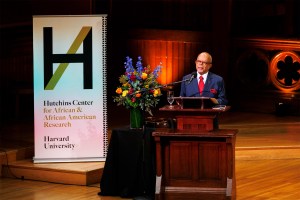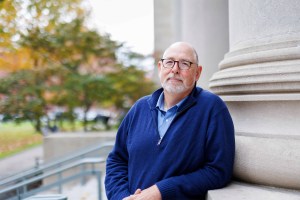Campus & Community
-
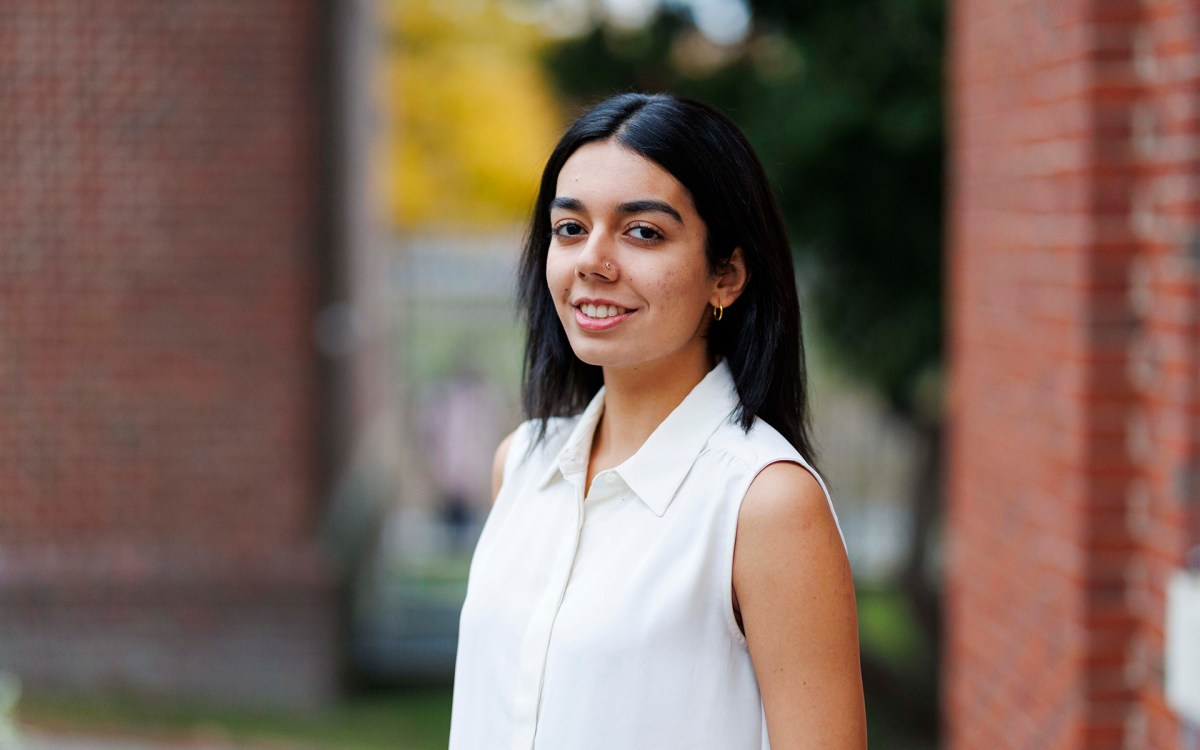
‘Exploring everything’ leads to Rhodes
Fajr Khan to represent Pakistan, plans career in clinical psychology
-

Setti Warren honored as lifelong public servant, remembered as bridge builder
Institute of Politics director, first elected Black mayor in Massachusetts ‘had superpower of knowing how to lift people up’
-
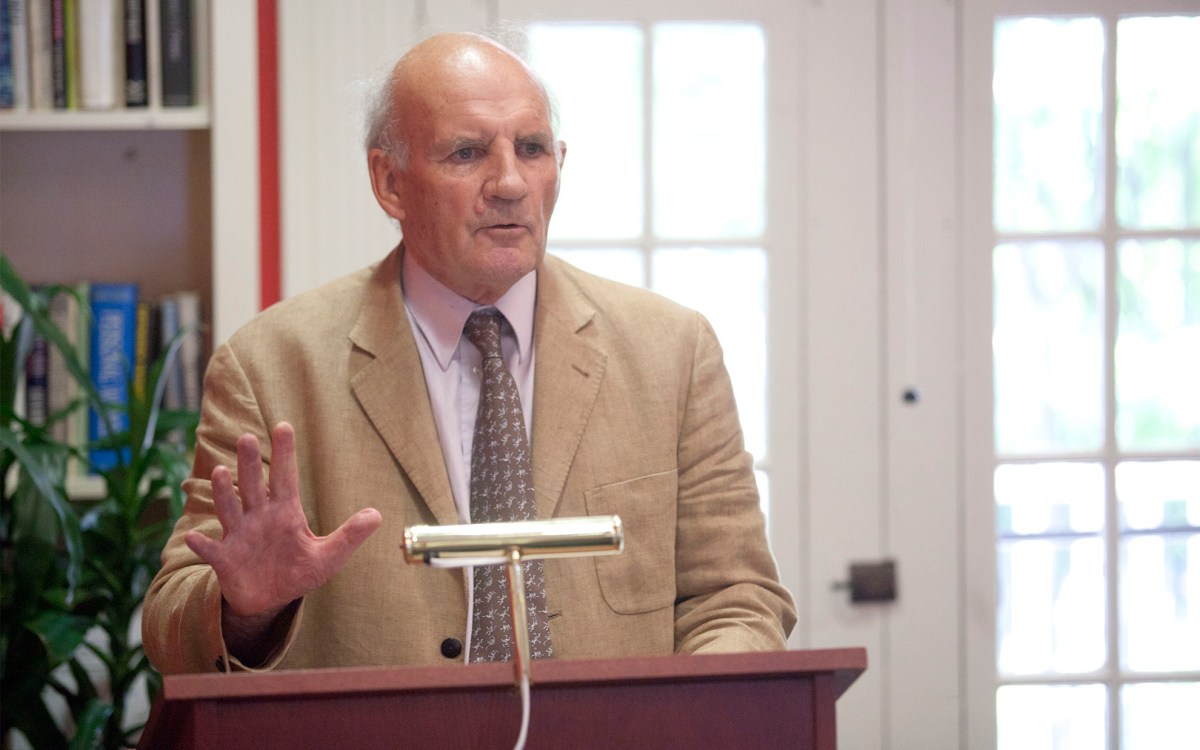
Roger Owen, 83
Memorial Minute — Faculty of Arts and Sciences
-

Ralph Mitchell, 90
At a meeting of the Faculty of Arts and Sciences on Nov. 4, 2025, the following tribute to the life and service of the late Ralph Mitchell was spread upon the permanent records of the Faculty.
-
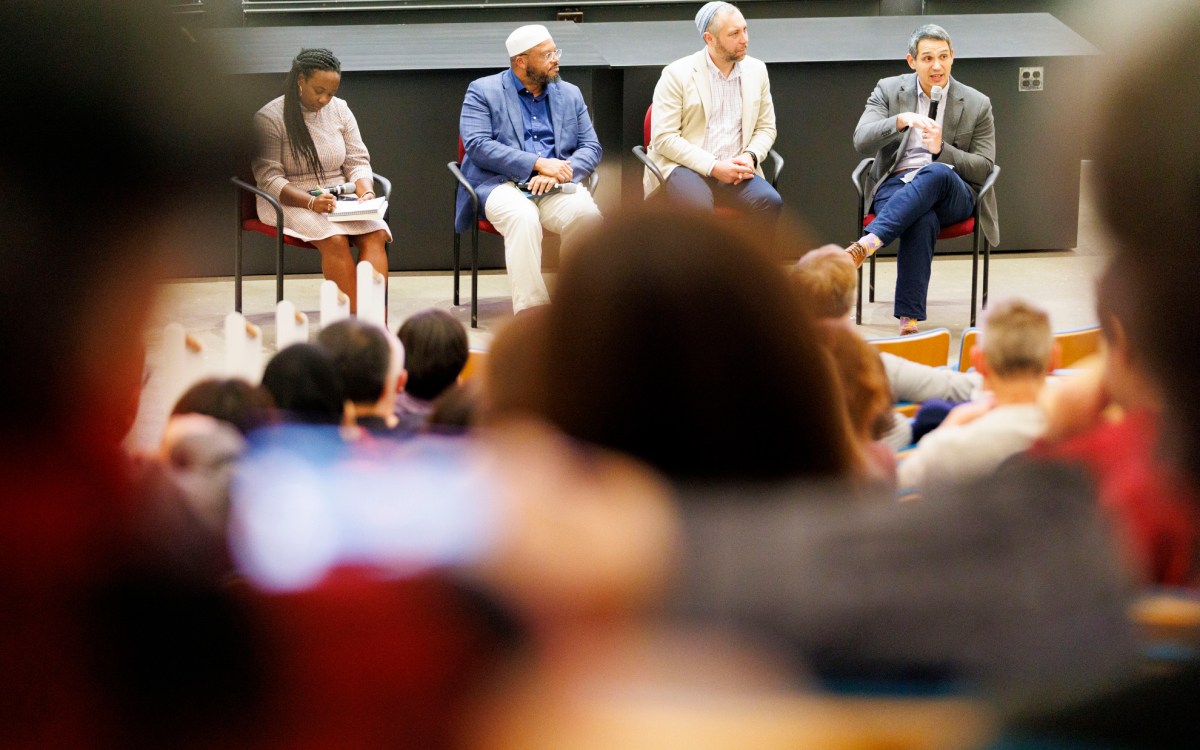
To begin bridging campus divides: Just sit down together and listen
Three religious leaders offer insights from different traditions at Parents’ Weekend panel
-

‘Designed to be different’: Harvard unveils David Rubenstein Treehouse
‘Visual connections,’ sustainability are key features of first University-wide conference center
-
Straus Center team finds Holy Grail
Its no wonder Sir Galahad cant find the Holy Grail.
-
Robert Nozick
At a meeting of the Faculty of Arts and Sciences on December 16, 2003, the following Minute was placed upon the records.
-
Fabulous annual festival of the arts begins Friday
Celebrating its 12th year, Arts First, Harvards annual celebration of students and faculty in the arts, lights up Harvard Square with performances, exhibits, and arts activities. Today, May 6, through Sunday, May 9, Harvard welcomes the public to over 225 music, theater, dance, film, and visual arts events (most free of charge). The festival is sponsored by the Universitys Board of Overseers.
-
Zuckerman establishes fellowship program
Mortimer B. Zuckerman, LL.M. 62, is giving $10 million to establish a graduate fellowship program that will enable Harvard University to attract 25 exceptional students each year as Zuckerman Fellows. The program will be open to candidates who have earned or are pursuing a business, law, or medical graduate degree at Harvard or another U.S. university and who want to pursue an additional degree at the Harvard Graduate School of Education, John F. Kennedy School of Government, or Harvard School of Public Health.
-
Papillomavirus’ M.O. better understood
Harvard Medical School (HMS) researchers have uncovered a missing link in our understanding of how human papillomaviruses gain their foothold in the rapidly dividing cells of the skin and mucous membranes. The discovery, reported in the April 30 Cell, could lead to new treatments for a host of human papillomavirus-related conditions, from the nuisance of plantar and genital warts to life-threatening precancerous cervical lesions.
-
Conference examines economics of health innovation
The economics of biomedical research was at center stage at Harvard Medical School (HMS) April 28 during a conference convened to answer critics who say new treatments and devices drive up health-care costs while bringing few health benefits.
-
The computer ate my job
As the nation limps toward economic recovery, uneasy Americans – jobless or not – harbor understandable anxiety. Could my job be done by a computer? Will it go overseas to be done far more cheaply? Will there be enough jobs to go around?
-
Undergrad education review released
Marking the end of the first phase of Harvard Colleges comprehensive review of undergraduate education, William C. Kirby, dean of the Faculty of Arts and Sciences and Edith and Benjamin Geisinger Professor of History, announced the release of A Report on the Harvard College Curricular Review. The report affirms Harvards commitment to a liberal education in the arts and sciences and proposes significant changes in the structure and content of the undergraduate experience.
-
Framed
The textured stone of the Weeks Footbridge provides an almost-Mediterranean look to a spring day on the Charles. Framed by the stone are rowers taking part in last Saturdays crew competition, in which Harvard took every race. (Staff photo Lindsay Pierce/Harvard News Office)
-
Mucus plays key role in cancer
Mucus is exciting to some cancer researchers. No kidding.
-
Notice for Faculty Council meeting
At its 12th meeting of the year (April 28) the Faculty Council discussed with Deans Benedict Gross, William Kirby, and Jeffrey Wolcowitz the recently released Report on the Harvard College Curricular Review. Professors Goran Ekstrom (Earth and Planetary Science), Eric Jacobsen (Chemistry and Chemical Biology), Richard Losick (Molecular and Cellular Biology), and Diana Sorensen (Romance Languages and Literatures), Co-chairs of the reviews four Working Groups, were also present for this discussion. A discussion of the review has also been scheduled for the May 4 Faculty Meeting, with the possibility that this consideration will be continued at the May 18 Faculty Meeting.
-
Independence day
Rebecca Wexler 05 plays electric violin with fellow Recklez band members during IsraelFest (Yom HaAtzmaut) in front of the Science Center on Tuesday. (Staff photo Jon Chase/Harvard News Office)
-
This month in Harvard history
April 14, 1955 – Steeplejack Laurie Young ascends the spire of the Memorial Church to survey the weathervane to determine whether it can be regilded in place. He begins the…
-
Memorial services set for Okin, Kelleher, Furdon
Susan Okin service May 2 Friends and family of Susan Moller Okin, a fellow at the Radcliffe Institute for Advanced Study, will host a memorial service on Sunday, May 2,…
-
Police reports
Following are some of the incidents reported to the Harvard University Police Department (HUPD) for the week ending April 24. The official log is located at 1033 Massachusetts Ave., sixth floor.
-
President Summers has May office hours
President Lawrence H. Summers will hold office hours for students in his Massachusetts Hall office on the following dates:
-
Clarke says Patriot Act preserves civil liberties
People who care about civil liberties in the United States should embrace rather than fight the USA Patriot Act, former Bush administration anti-terrorism coordinator Robert Clarke told a standing-room-only audience at the John F. Kennedy School of Government April 21.
-
Awards honor women leaders, present and future
When Hanna Holborn Gray, president emerita of the University of Chicago and Fellow of Harvard College, was pursuing a Ph.D. in history at Harvard in the 1950s, female role models in academia were scarce. At the time, Harvards Faculty of Arts and Sciences boasted exactly one female with tenure – Helen Maud Cam – and even she couldnt enter the Faculty Club by the front door or Lamont Library at all. Gray launched an impressive career in academia nonetheless, refusing to be hobbled by the factor that derailed many a budding female professors career: marriage.
-
Time names Lander one of world’s most influential people
In the April 26 special issue of Time magazine, Professor of Systems Biology Eric Lander, founder and director of the Eli and Edythe L. Broad Institute, is featured as one of the worlds 100 most influential people.
-
Crimson drowns Navy
Harvard mens heavyweight crew further expanded its trophy collection this past Saturday (April 24) with a nine-second triumph over visiting Navy in the 69th rowing of the Adams Cup. Earlier this month, the defending national champion Crimson (ranked No. 1 in the national polls by USRowing) captured the Stein Trophy in Providence and the Compton Cup on the Charles en route to its 5-0 dual-meet record.
-
Sports briefs
Heavy-hitting frosh lands league nod, again For the second time this season, freshman softballer Virginia Fritsch has been named Ivy League Rookie of the Week. In the Crimson’s last six…
-
Dean Shinagel receives Nolte Award
Dean of Continuing Education and University Extension Michael Shinagel received the Julius M. Nolte Award for Extraordinary Leadership at the annual conference of the University Continuing Education Association (UCEA) April 16 in San Antonio. Established in 1965, the Nolte Award is the most prestigious of all UCEA awards and is given to an individual in recognition of unusual and extraordinary contributions to the cause of continuing education on the regional, national, and international level.
-
Institute kicks off collaborative effort
The Harvard Stem Cell Institutes inaugural symposium kicked off in interdisciplinary fashion Friday (April 23) with discussions that explored the business, ethics, and science of stem cell research.
-
Little Foundation sponsors DEAS program
The Altran/Arthur D. Little Foundation for Innovation will provide $500,000 in the form of money, professional expertise, and consulting to the Harvard Division of Engineering and Applied Sciences (DEAS) during the next five years to help support a broad-based program on innovation in science and technology.
-
Students visit ‘Harvard of China’
Harvard College, striving to increase international experiences for its students, may now have one more arrow in its quiver, thanks to the student-initiated Harvard in Asia Project (HIAP). Chaired by David Yuan 06 and Silas Xu 05, HIAP returned triumphant from its first-ever exchange with Peking University, or Beida, in Beijing earlier this month. During spring break, 21 Harvard students made the 10-day trip, aimed at enhancing cross-cultural understanding between the students of the two universities – and at changing the Harvard students college experience.
-
Scientists discuss experiments on self
Yes, self-experimentation is exactly what it sounds like. Its when a researcher uses him- or herself as the (or one of the) subjects of an experiment. A recent gathering at the School of Public Health (HSPH) looked into the practice in a discussion titled Self-Experimentation by Investigators: Panel and Case Discussion. The exchange produced a robust examination of the relationship between good ethics and rigorous science, between junior and senior investigators, and between scientists and institutional review boards (IRBs). The March 26 event, sponsored by the Schools Human Subjects Committee (HSC), drew researchers and IRB members from across Harvard, as well as from other universities and hospitals.
-
Dangerous silences
Within the past several years, articles in the mainstream media have sounded an alarm about a widening black gender gap. In African-American communities, women are outpacing men in professional and educational achievement, while incarceration and unemployment rates for black men far exceed those for black women. Some charge that this phenomenon is affecting marriage possibilities and family structures among blacks.
-
Loeb physics lecturer explains string theory
String theory – the idea that the universe is made up not of particles but of tiny vibrating strings – is in the midst of a second revolution that some physicists hope will lead to the long-sought single theory that explains how the universe functions, according to Columbia University Professor Brian Greene.
-
Biomarker identifies diabetes risk in women
Researchers from Brigham and Women’s Hospital (BWH) have found that elevated levels of a biomarker that corresponds to a condition in which arteries do not dilate properly can be an indicator of type 2 diabetes risk in women. In addition, endothelial dysfunction – the inflammatory condition in which arteries do not dilate properly – is also an indicator of cardiovascular disease, leading researchers to believe that it could be an underlying link between the two epidemics. The findings are published in the April 28 issue of the Journal of the American Medical Association.
-
Gates, Marton receive Wharton Awards
W.E.B Du Bois Professor of the Humanities Henry Louis Gates Jr. and journalist and human rights advocate Kati Marton have been honored with the ninth annual Edith Wharton Women of Achievement Awards. The awards were presented at an April 7 ceremony by Edith Wharton Restoration, a nonprofit organization dedicated to the restoration of The Mount – the authors 1902 estate and gardens in Lenox.
